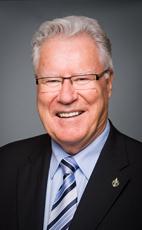Mr. Speaker, today, I will be speaking on the role of the Parliamentary Budget Officer and the estimates process.
I am pleased to add to the debate on the current role of the Parliamentary Budget Officer to provide independent analysis to parliamentarians in the context of the estimates process. This government understands that parliamentarians must have the information they need to consider estimates and public supply bills. We understand, as well, that the Parliamentary Budget Officer must have the information he needs to provide parliamentarians with independent analysis of government spending.
This is a fundamental part of Canada's system of government and it is one of the keys to assuring Parliament and Canadians that public resources are being used efficiently and effectively. In our system of government, it is the responsibility of the government to prepare its budgets and policy agenda and the responsibility of Parliament to hold government to account for its actions and resulting outcomes.
That is why, upon coming to power in 2006, our Conservative government passed the Federal Accountability Act, the most sweeping anti-corruption legislation, after 13 years of Liberal mismanagement. The act continues to ensure that Parliament has the information it needs to hold the government to account.
The estimates process is a good example. Each year the government prepares main estimates and supplementary estimates, as required, in support of its request to Parliament for authority to spend public funds. This request is formalized through the tabling of appropriate bills in Parliament.
Supplementary estimates seek the funding required by departments and agencies to implement government-approved programs throughout the year. They are also required to transfer funds approved in the main estimates from one organization to another or within organizations, and from one appropriation to another. In addition, the supplementary estimates are used to inform Parliament of changes in the estimated costs of programs that are authorized by legislation other than the appropriation acts. Tabling the main estimates and supplementary estimates to seek Parliament's authority for spending is indeed a critical part of Parliament's oversight of the government's spending plans.
However, we are not only providing information to parliamentarians. We are providing information to Canadians. By making information accessible, we are also empowering Canadians to hold government to account. In fact, Canada is a leader in providing accessible information to citizens. Among other things, our progressive government's Federal Accountability Act signified the expansion of the scope of the Access to Information Act, created the whistleblower protection act and enforced the Conflict of Interest Act.
The Federal Accountability Act provides Canadians with the assurance that the power entrusted to the government is being well used and exercised in the public interest. The act, and its supplementary action plan, contains dozens of other measures and hundreds of amendments of some 45 federal statutes that touch virtually every part of government and beyond. My colleague made mention about that in his speech earlier this afternoon.
We also recognized that parliamentarians and parliamentary committees need to access independent objective analysis and advice on economic and fiscal issues to better hold the government to account for its decisions. That is why we established the position of the Parliamentary Budget Officer within the Library of Parliament.
The mandate of this officer is, first, to provide independent analysis to the Senate and House of Commons about the state of the nation's finances, the estimates of the government and trends in the national economy. Second, it is to undertake research into the nation's finances and economy and the estimates of the government, where requested to do so by certain parliamentary committees. Third, when requested to do so by a member or a committee, it is the office's mandate to estimate the financial cost of any proposal that relates to a matter over which Parliament has jurisdiction. The job of the Parliamentary Budget Officer, then, is to give parliamentarians non-partisan information and independent analysis surrounding the nation's finances and the economy.
Our government's commitment to make our public institutions more accountable and more transparent is clear. We have taken strong action to provide the Parliamentary Budget Officer with significant amounts of public and non-publicly available information to conduct analysis and render decisions. For our part, we support a non-partisan Parliamentary Budget Officer's interest in providing parliamentarians and the public with more timely and easy to use data on departmental spending. For example, we regularly share publicly available information with that office, such as the supplementary estimates, and we respond to requests for information from the PBO with the appropriate publicly available information.
Specifically, departments assess the nature of the information that the Parliamentary Budget Officer requests and what documents can or cannot be shared. That does not include information that falls within the scope of cabinet confidences. This information is protected in accordance with section 79.3 of the Parliament of Canada Act. Nevertheless, we are committed to continue to ensure transparency and diligence in providing an unprecedented amount of information.
Without a doubt, this government is committed to improving accountability and increasing transparency. We have proven that, not only with words but with actions: first, through the estimates process; second, through the implementation of the Federal Accountability Act; and third, by establishing and supporting the work of the Parliamentary Budget Officer.
The measures I have talked about today help provide Canadians with the honest and open government that they deserve, one that acts transparently, ensures value for money and demonstrates accountability for the people of this country. Unlike the members of the NDP, we believe that the current structure of the Office of the Parliamentary Budget Officer can provide insightful, non-partisan analysis of fiscal matters within its current mandate.

